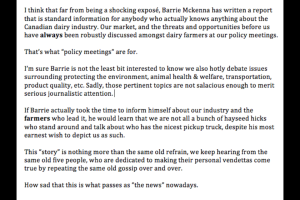Mondays are busy days on the farm and in the farmhouse. We generally take care of just the necessary chores on Sunday, so Monday really signals the start of a new, busy work week. But I’ll still usually find time to sit down with a cup of coffee, usually after the kids are on the bus to school, to go through my twitter feed. This is mostly a pleasurable, relaxing time of day for me. Not today. I was confronted with this article in the Globe and Mail by Barrie McKenna, who has added to his rather lengthy repertoire of anti-supply management opinion pieces with this: http://www.theglobeandmail.com/report-on-business/the-world-is-rapidly-closing-in-on-canadas-dairy-industry/article23678491/
I contacted a few of my friends in the industry, a dairy farmer and an industry leader. Here is what they had to say:

Jennifer Hayes’ thoughts on the article. Find her on Twitter @FarmShigawake for more thoughtful commentary on supply management.
Initially, I was tempted to just move on with my day, but the more I thought about this article, the more I realized that I have much to say to Mr. McKenna, and that I would like to have my opinion, and the opinion, I believe, of all Canadian dairy farmers, heard as well. I don’t pretend to be an expert on trade, or supply management either, for that matter. But Mr. McKenna’s biased opinion piece leaves me with the impression that either he doesn’t understand the system or that he blatantly takes advantage of his readers’ lack of knowledge on the subject presented here.
Mr.McKenna’s first sentence already shows his bias. He says our dairy “regime” is sealed off from the rest of the world. While I know that we do use tariffs to limit imports of dairy products from other countries, Mr. McKenna conveniently leaves out the fact that we allow more tariff free imports than the US and the EU – 6% of imports are tariff-free in Canada, with only 2.75% tariff free imports allowed into the US. Additionally, as part of the new CETA agreement, Canada will allow 9% of the cheese consumed in Canada to come from the EU tariff free, up from the current generous access of 5%. The (EU) currently imports only a modest number of Canadian dairy products, despite the fact that the EU is a market about 15 times the size of Canada.
Moving further along in the article, Mr. McKenna references a confidential report from the Dairy Farmers of Ontario. But rather than being what he seems to think is a smoking gun detailing Canada’s dairy woes, it rather is a piece that “indeed is confidential, and was prepared in the context of reviewing policy and identifying growth opportunities among farmer delegates … it actually identifies that there is an opportunity for more competitive pricing to compete in the domestic dairy ingredients market which is already directly subject to international price competition from duty-free imports. More competitive pricing will create some export opportunities but these are small compared to the opportunities within the domestic market and below current permitted exports.” https://www.milk.org/Corporate/News/NewsItem.aspx?id=5461
I have difficulty believing the statement that Canada is facing a growing glut of unwanted milk. How on earth would Mr. McKenna like to explain the extra quota allotted to Canadian farmers over the last year and a half? BC farmers have received an extra 10% of quota, and Ontario, Quebec, Nova Scotia, New Brunswick and PEI have received 5%, while the remaining Western provinces have received an amount in-between these numbers. This extra quota has been allotted to encourage farmers to produce more milk to fill the increased demand for milk products by Canadian consumers. I’m sorry, Mr. McKenna, but numbers don’t lie.
Further in the article, the author states that creating a new market to compete with foreign imports of milk proteins or export at world milk prices amounts to an “illegal subsidy.” The irony is actually laughable. Mr. McKenna would like to see our borders open to imports – imports that are very highly subsidized by their country of origin. Care to explain your double standards, Mr. McKenna?
Mr. McKenna drops his two most infuriating comments at the end of the article. First of all, he says that consumers pay an inflated price. Now, if you remember, I addressed this in a previous post, here. Farmers are paid the cost of producing the milk. Period. The recent reduction in the price paid to farmers ($0.06/L for us on our farm) because of decreased costs of production illustrates this perfectly. Keeping prices artificially low in the store by supplying farmers with government subsidies (like in the US, which appears to be Mr. McKenna’s ideal system) does not benefit the consumer, but rather inflates their taxes. Secondly, he indirectly calls farmers greedy. Now, I personally take offense to this, and I’m sure other dairy farmers do as well. Is wanting a fair price for the product we produce “greedy”? Maybe he should talk to dairy farmers in the UK and France who are dumping their milk to protest the dropping milk price, a price with which they cannot cover the cost of production. Are they, too, greedy?
Let me paraphrase my opinion like this: supply management is a great system. It ensures a stable economic outlook for farmers and stable prices in the grocery stores for consumers. Stability on the farm means that farmers can dedicate more of their time and investments in sustainability, technology and advancing animal welfare. With supply management, we all win, consumers and farmers alike. And no, Mr. McKenna, dairy farmers don’t think the system is broken. I am a dairy farmer, and I support supply management – because it WORKS.


